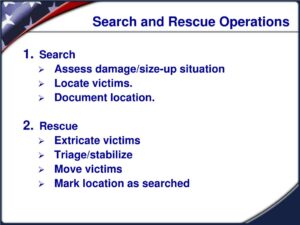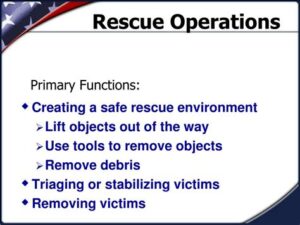Back to: Physical and Health Education JSS 2
Welcome to class!
In today’s class, we shall be talking about the importance of rescue operations. Please enjoy the class!
Importance of Rescue Operations
Imagine this: you’re caught in a raging blizzard, lost and alone. Or maybe you’re trapped in a collapsed building after an earthquake. In these dire situations, rescue operations become the lifeline, the bridge between despair and hope. But why are these operations so crucial? Why should we, as individuals and as a society, value and support them?
Saving Lives:

The most fundamental reason for the importance of rescue operations is simple: they save lives. Every minute, every hour counts when someone is in danger. A swift and efficient rescue can mean the difference between life and death, between permanent injury and full recovery.
Beyond the immediate physical impact, rescue operations also have a profound psychological effect. The sight of rescuers arriving, the feeling of being pulled from danger, can offer immense hope and comfort in times of crisis. It reminds us that we’re not alone, that there are people dedicated to saving us, even in the face of seemingly insurmountable odds.
Beyond Disaster Response:
While rescue operations are often associated with natural disasters and accidents, their importance extends far beyond these scenarios. They play a vital role in:
- Medical emergencies: When someone suffers a heart attack, stroke, or other critical medical event, quick and skilled rescue can be the difference between life and lasting damage.
- Search and rescue: From missing hikers in the mountains to children lost in forests, rescue teams tirelessly search for those in danger, often in harsh and unforgiving environments.
- Animal welfare: Animals too can face emergencies, be it getting trapped in floods or wildfires. Rescue teams trained in animal handling can provide critical assistance in such situations.
The Pillars of Rescue:

Effective rescue operations rely on a strong foundation of:
- Training and expertise: Rescuers undergo rigorous training in various skills, from first aid and CPR to technical rope work and confined space rescue. This ensures they can handle any situation with competence and precision.
- Technology and equipment: From specialized search drones to heavy-duty rescue vehicles, technology plays a crucial role in locating victims, providing communication, and facilitating safe extraction.
- Collaboration and teamwork: Rescue operations often involve multiple agencies and teams working together seamlessly. This coordinated effort is essential for maximizing efficiency and ensuring everyone’s safety.
Becoming a Hero Yourself:
While we may not all become full-fledged rescuers, understanding the importance of their work and the skills they possess can empower us in various ways:
- Basic life support skills: Learning CPR and first aid can equip you to handle emergencies in your own life or assist others in need before professional help arrives.
- Disaster preparedness: Knowing how to prepare for and respond to natural disasters in your area can not only keep you and your loved ones safe but also free up valuable resources for professional rescuers to focus on those in critical situations.
- Supporting rescue organizations: Volunteering your time or donating resources to organizations involved in rescue operations can make a significant difference in their ability to serve the community.
In conclusion, rescue operations are not just about adrenaline rushes and heroic feats; they are about the fundamental human instinct to help others in times of need. By understanding their importance, appreciating the dedication of the individuals involved, and taking steps to prepare ourselves, we can all play a part in building a safer and more resilient world, one where hope prevails even in the darkest of hours.
Remember: Every individual has the potential to be a hero. By equipping yourself with knowledge and skills, you can become a valuable asset in times of crisis.
Supporting rescue organizations and preparedness initiatives strengthens our communities and ensures that help is always within reach.
The spirit of rescue transcends borders and cultures. Let’s work together to create a world where no one is ever truly alone in the face of danger.
We have come to the end of today’s class. I hope you enjoyed the class!
In the next class, we shall be discussing Agencies and organizations involved in rescue operation.
In case you require further assistance or have any questions, feel free to ask in the comment section below, and trust us to respond as soon as possible. Cheers!
Question Time:
- Can you think of situations where a seemingly routine task or skill (e.g., map reading, swimming) could become crucial in rescue operations?
- How can advances in technology, both for communication and rescue tools, further improve the effectiveness of these operations?
- What are the ethical considerations involved in prioritizing rescues in large-scale disaster situations?
